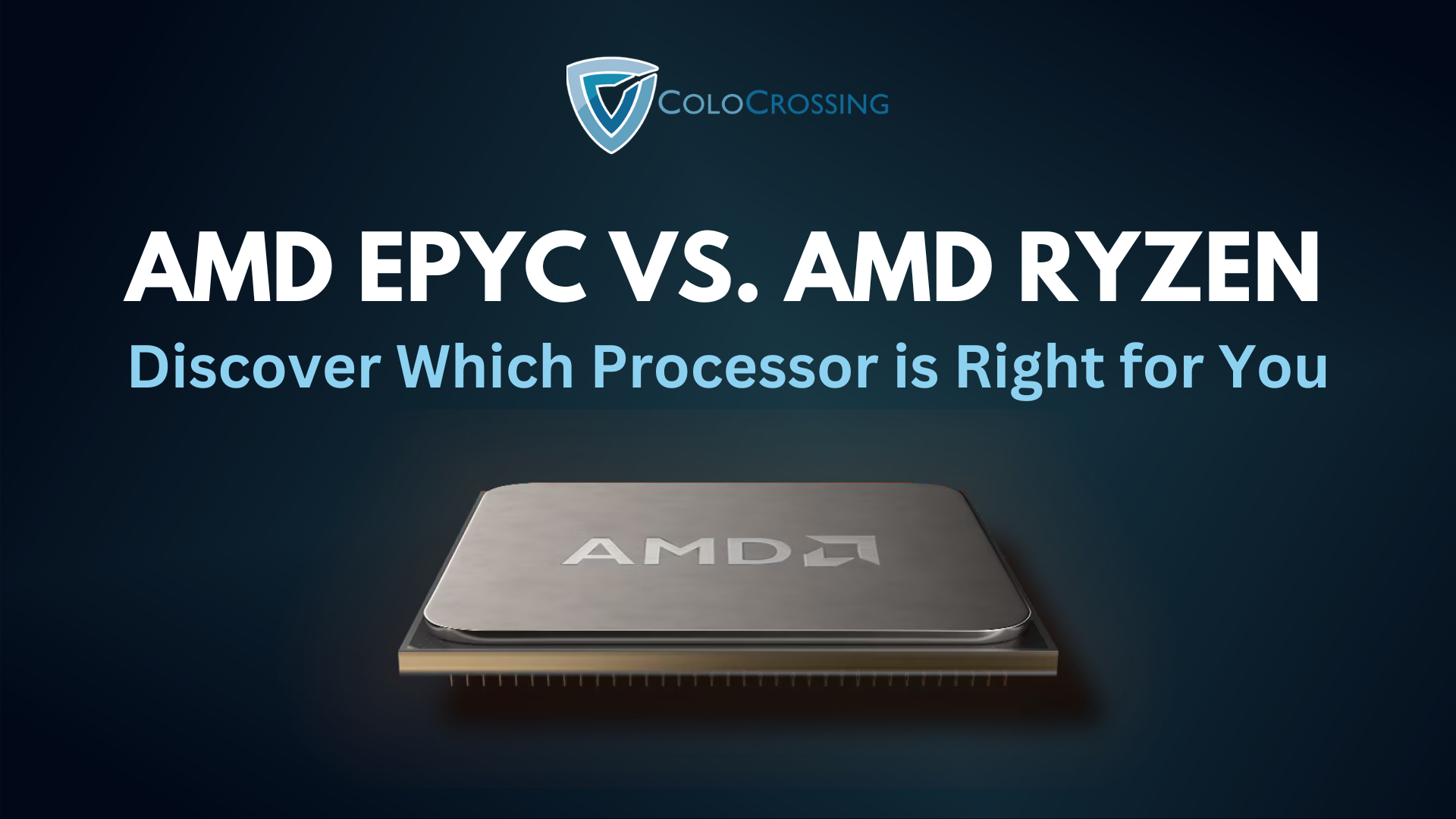AMD EPYC vs AMD Ryzen Servers: Which Is Right for Your Hosting Needs?
AMD EPYC vs AMD Ryzen Servers, choosing the right processor for your hosting environment is essential for performance, reliability, and cost-efficiency, VPS . AMD has become a leading name in server-grade computing, and at ColoCrossing, we offer both AMD EPYC and AMD Ryzen servers to meet a wide range of use cases, dedicated hosting.
Here’s a closer look at how EPYC and Ryzen compare, and which might be the right fit for your needs, dedicated server.
What Is AMD EPYC?
AMD EPYC processors are purpose-built for servers and data centers. With high core counts, large memory capacity, and support for extensive PCIe lanes, EPYC is designed to handle complex, high-demand workloads like virtualization, large databases, and cloud infrastructure. AMD EPYC vs AMD Ryzen Servers, the latest EPYC chips can feature up to 96 cores and 192 threads, making them ideal for parallel processing.
Best for:
- Virtualization and hypervisors
- Cloud platforms
- Big data and databases
- AI and machine learning workloads
- High-performance computing (HPC)
Why Choose ColoCrossing EPYC Servers:
ColoCrossing offers EPYC-powered servers in several prime locations. These servers are backed by premium bandwidth, DDoS protection, and remote management. AMD EPYC vs AMD Ryzen Servers, for businesses running critical workloads that require consistency and uptime, EPYC delivers the performance and reliability needed to scale with confidence.
What Is AMD Ryzen?
AMD Ryzen processors are known for high clock speeds and excellent single-threaded performance. While they don’t offer as many cores as EPYC, they excel at tasks where per-core performance matters. Ryzen CPUs, such as the Ryzen 9 5950X or 7950X, typically offer up to 16 cores and 32 threads, making them ideal for high-speed, low-latency hosting.
Best for:
- Game server hosting
- Development and CI environments
- Small to medium websites
- Database hosting
- Web apps with lower concurrency needs
Why Choose ColoCrossing Ryzen Servers:
ColoCrossing offers high-performance Ryzen servers that deliver exceptional value for the price. These systems are perfect for customers who want powerful processing at a lower cost. AMD EPYC vs AMD Ryzen Servers, they are popular among game server hosts and web developers who need responsive compute power without enterprise-level infrastructure overhead.
EPYC vs Ryzen: Side-by-Side Comparison
| Feature | AMD EPYC | AMD Ryzen |
|---|---|---|
| Max Cores/Threads | Up to 96 cores / 192 threads | Up to 16 cores / 32 threads |
| Memory Support | Extremely high, up to 6TB+ | Up to 128GB |
| Power Optimization | Optimized for data center loads | Optimized for desktop-level workloads |
| Performance Focus | Best for parallel, multi-threaded tasks | Best for single-threaded, high-speed tasks |
| Best Use Case | Virtualization, cloud, enterprise workloads | Game servers, dev environments, small business hosting |
| ColoCrossing Availability | Yes | Yes |
Which Should You Choose?
If your application demands high concurrency, massive memory, and scalability, AMD EPYC is the clear winner. On the other hand, if your workload is lighter or needs high-frequency processing, AMD Ryzen offers exceptional value and speed at a more accessible price point.
At ColoCrossing, you can find both options with flexible configurations. AMD EPYC vs AMD Ryzen Servers, whether you are spinning up a new project or migrating an existing workload, our team is here to help you choose the right system and get online quickly.
Explore Our AMD Server Lineup
Our team is ready to help you deploy AMD Ryzen or EPYC servers in any of our nationwide data center locations including Buffalo, Los Angeles, San Jose, Seattle, Atlanta, Dallas, New York City, Chicago, Toronto, and Dublin. AMD EPYC vs AMD Ryzen Servers, all ColoCrossing servers come with 24/7 support, full root access and included basic DDoS protection.
Need help choosing?
Reach out to our sales team or explore available servers today and let ColoCrossing power your next deployment.
